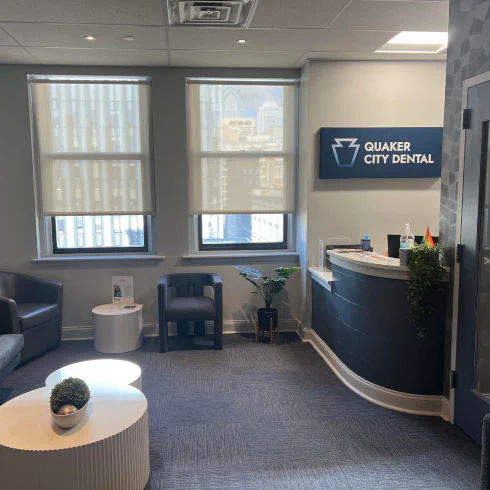A cavity filling is used to restore a tooth after decay has formed, repairing damage by filling the cavity with a durable material. A dental sealant is a preventive treatment applied to the grooves of molars to create a protective barrier against bacteria and plaque, helping to prevent cavities before they start.
Tooth Fillings & Dental Sealants in Philadelphia, PA
-
Cost
Our fillings and sealants are affordably priced to accommodate different budgets while ensuring excellent dental health. Costs vary based on the number of treated surfaces.
Office Fees -
Procedure Duration
A filling or sealant appointment usually takes 30–60 minutes, depending on the number of teeth being treated.
Request an Appointment -
Recovery Time
Recovery from cavity fillings and dental sealants is quick, with most patients resuming normal activities immediately and any minor sensitivity fading within a few days.
Contact Us
Fill Cavities and Prevent Tooth Decay with Tooth Fillings & Dental Sealants near Philadelphia, PA
The Noble Dental Group family of practices specializes in providing high-quality dental fillings and sealants to protect and restore your teeth. Whether repairing decay or preventing cavities, our minimally invasive treatments ensure lasting oral health and comfort.
Dental Fillings for Cavity Repair
Dental fillings are used to restore teeth that have been damaged by cavities. When decay forms, it can compromise the structure of the tooth, leading to pain and potential infection. During the procedure, we remove the decayed portion of the tooth and fill the area with a durable, tooth-colored composite material that blends naturally with your smile. Fillings not only restore the strength and function of the tooth but also help prevent further decay from spreading. We prioritize patient comfort by using gentle techniques and advanced materials that provide long-lasting results.
Dental Sealants for Cavity Prevention
Dental sealants are a preventive treatment designed to protect teeth from cavities before decay develops. They are most commonly applied to the chewing surfaces of molars and premolars, where deep grooves and pits can trap food and bacteria. The sealant is a thin, protective coating that quickly bonds to the tooth’s surface, creating a smooth barrier against plaque and acids. This treatment is especially beneficial for children and teens who may have difficulty thoroughly cleaning these hard-to-reach areas. However, adults with cavity-prone teeth can also benefit from sealants. The application process is quick, painless, and can significantly reduce the risk of tooth decay over time.
01.
Fillings & Sealants Process
Fillings:
- The process begins with numbing the area around the affected tooth to ensure comfort.
- Any decayed or damaged tooth material is removed, and the area is cleaned to prevent further decay.
- The cavity is then filled with a durable material that is carefully shaped to match your natural tooth and polished for a smooth, functional finish.
Sealants:
- The teeth to be sealed are thoroughly cleaned and dried to ensure proper adhesion.
- A special gel is applied to the chewing surfaces to help the sealant bond effectively.
- The sealant material is carefully painted onto the teeth and hardened with a special light, creating a strong protective barrier against decay.
02.
Next Steps
Maintain Good Oral Hygiene: Brush twice daily with fluoride toothpaste and floss regularly to prevent decay around your dental fillings or sealants.
Schedule Routine Checkups: Regular dental visits allow our team to monitor the condition of your fillings or sealants and reapply sealants if needed.
Address Any Issues Promptly: If you experience sensitivity or discomfort or notice any wear or damage, contact our office for an evaluation and necessary adjustments.
FAQ
-
What's the difference between a cavity filling and a dental sealant?
-
How long do cavity fillings take?
Cavity fillings typically take 30 minutes to an hour, depending on the size and number of cavities being treated.
-
How long do dental fillings last?
The lifespan of dental fillings depends on the material used and your oral hygiene habits. Composite fillings generally last 5–10 years, while amalgam fillings may last even longer. Regular dental checkups can help monitor your fillings and ensure that they stay in good condition.
















